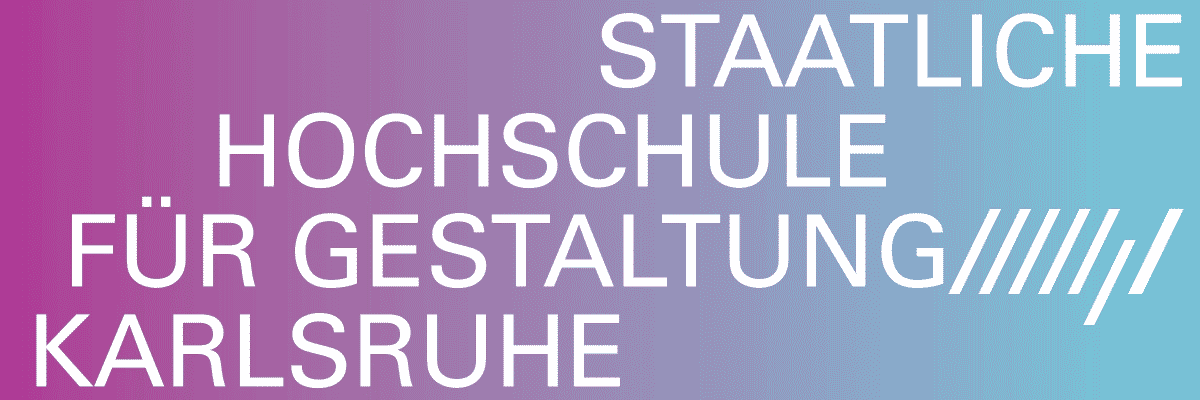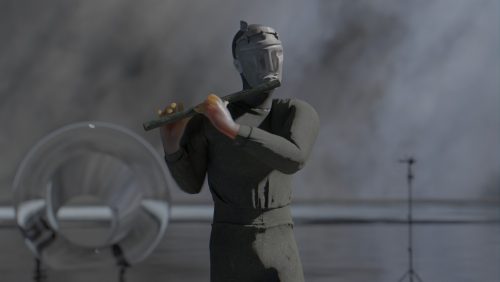
Jeremy Palluce, Marco Spitz
FIREPLACE
Project Info
- 💙 Kaiserwache
- 💚 Christina Sperling, Lena Reckord, Ilja Zaharov
- 🖤 Jeremy Palluce, Marco Spitz
- 💜 K.ELIOT, Stefan L., Vanessa R., C. LAVY, Ilja Zaharov
- 💛 Christina Sperling
Share on
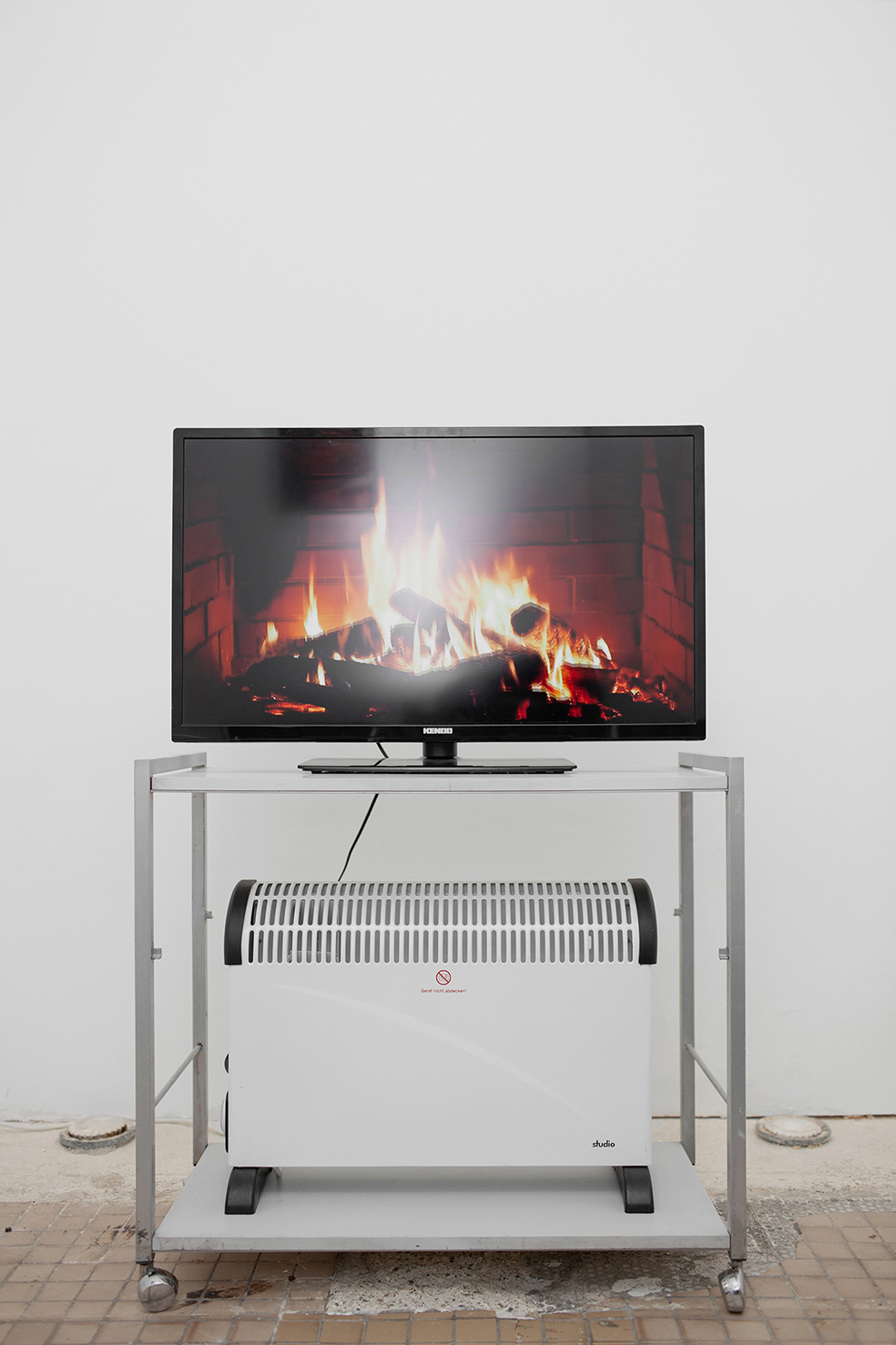
Advertisement
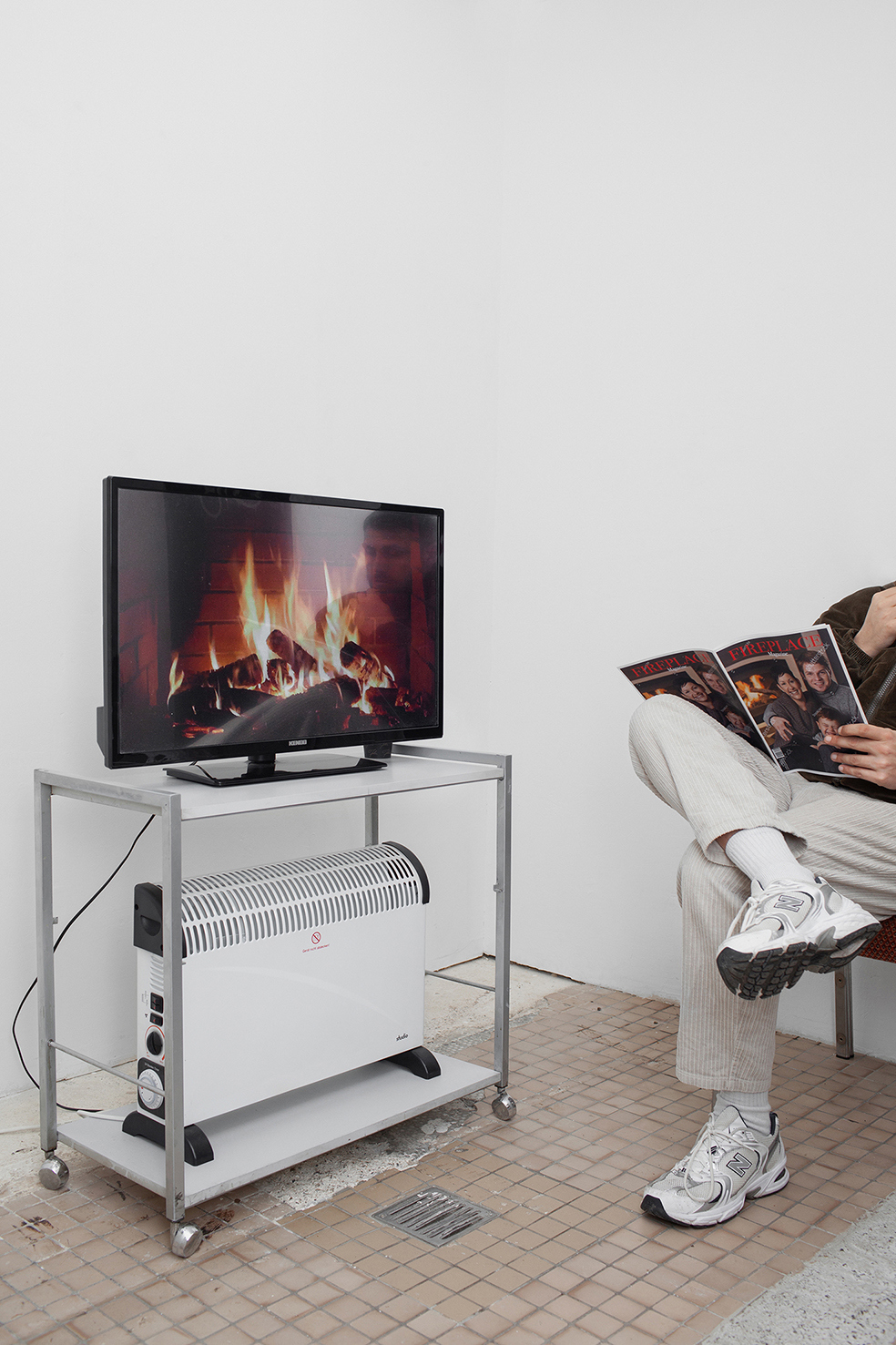
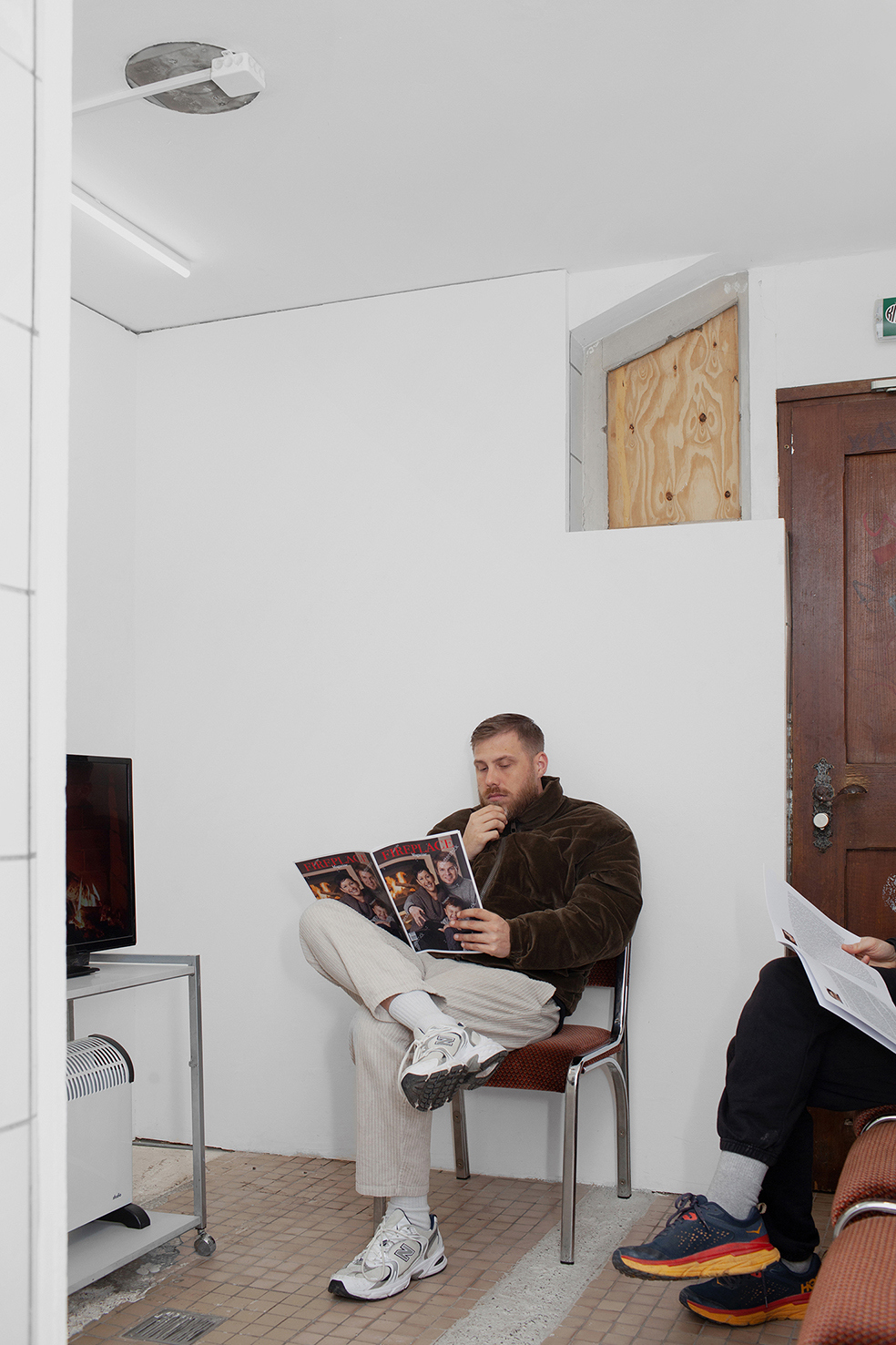
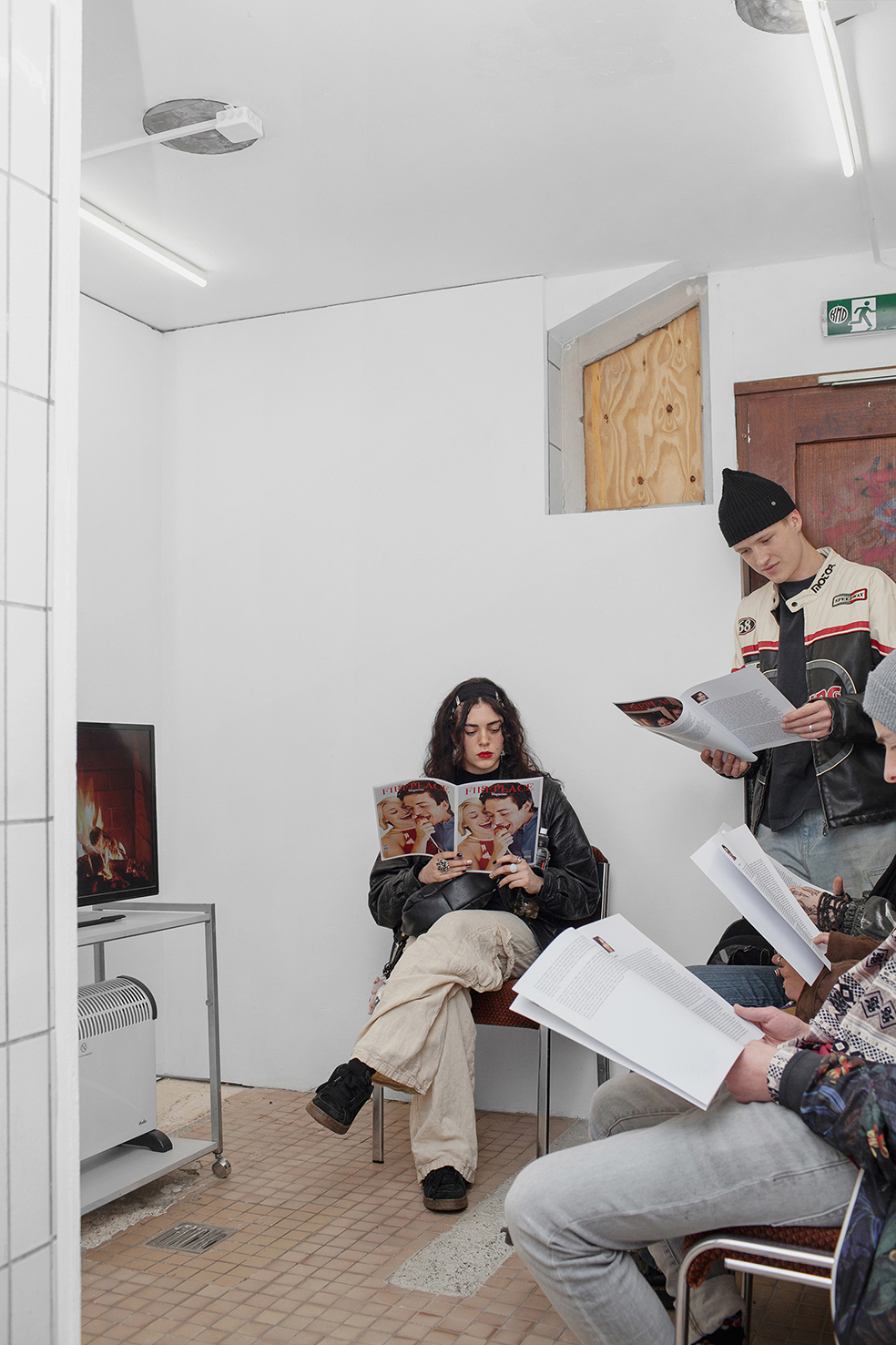
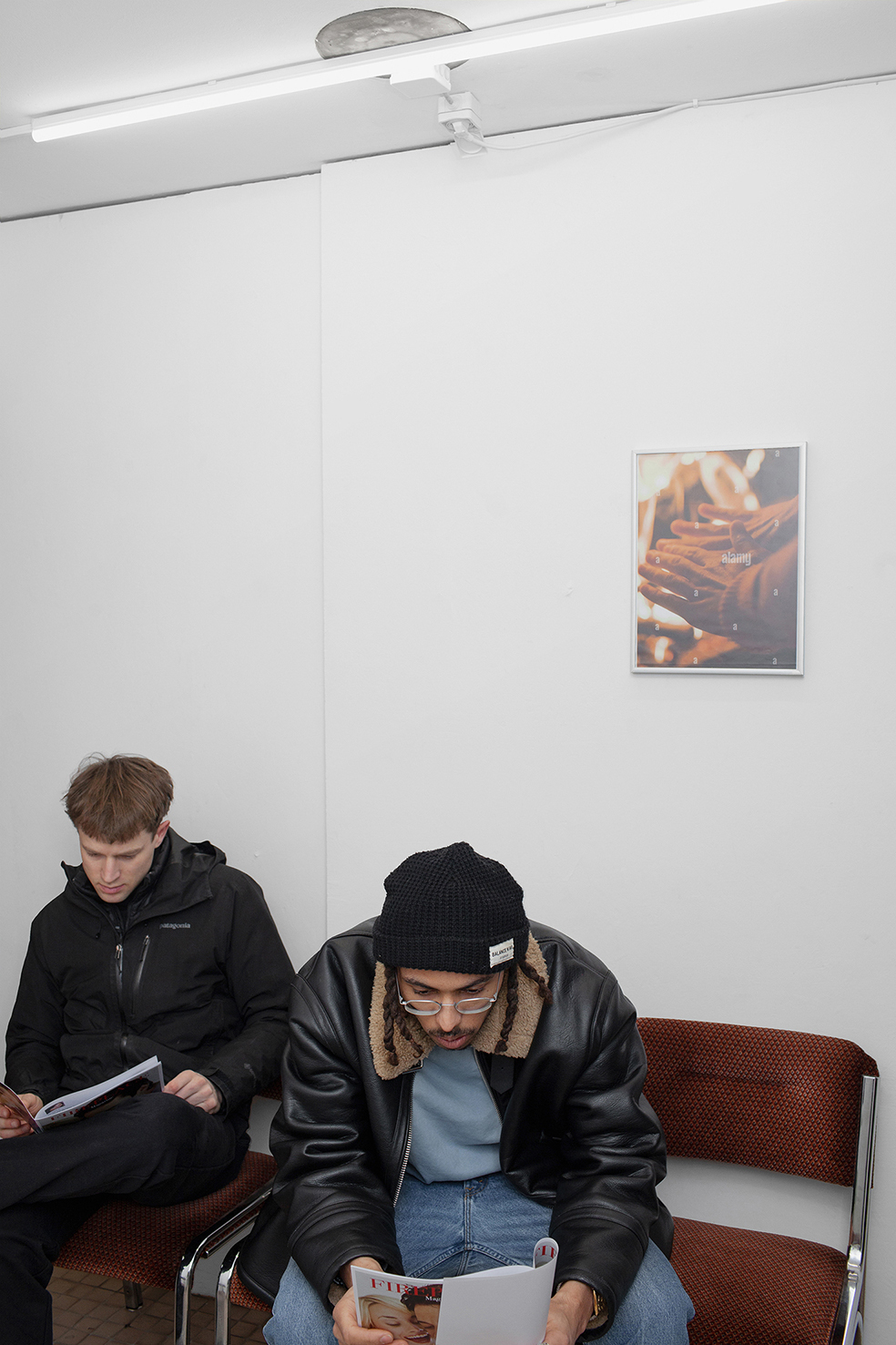
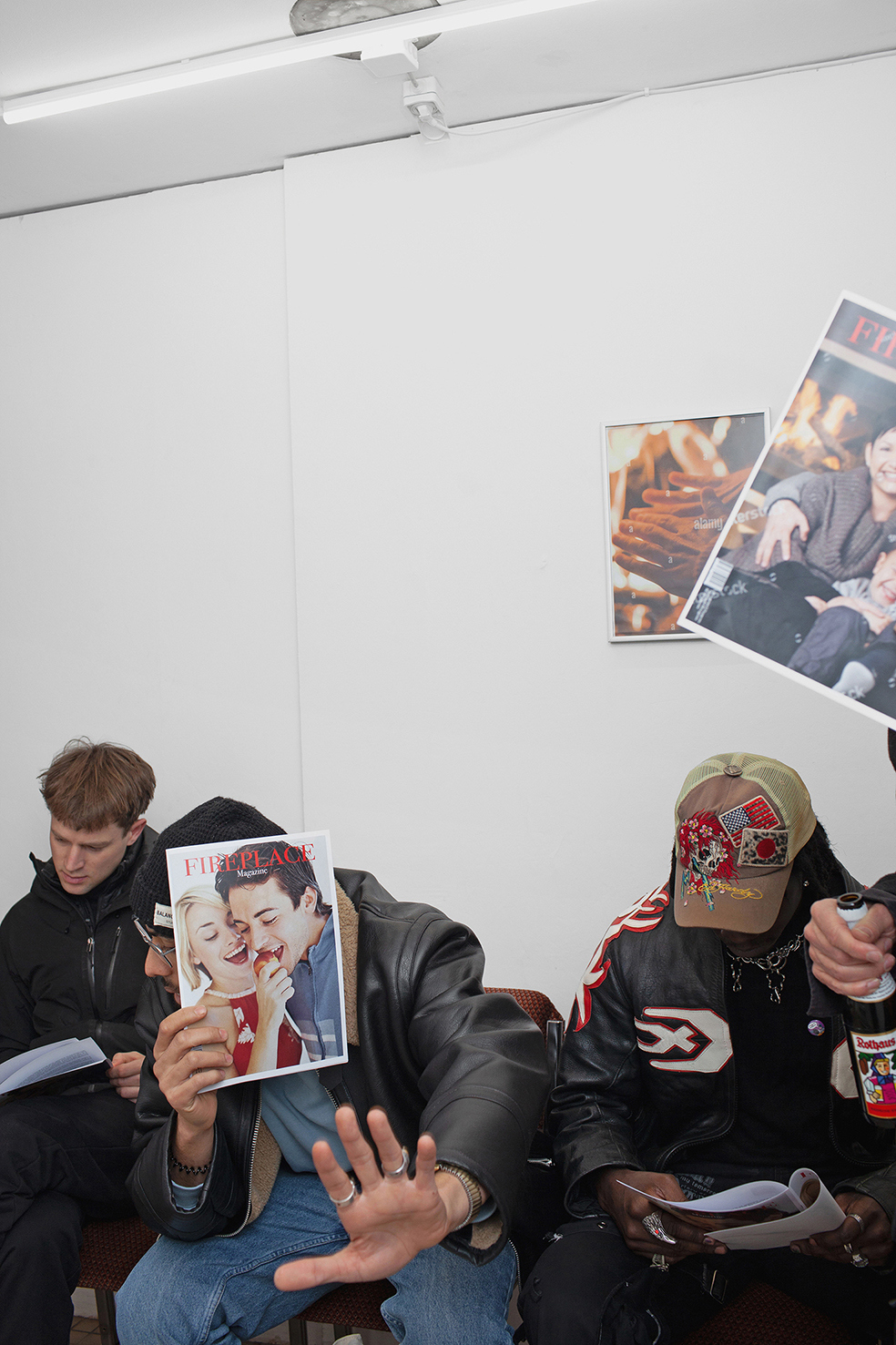
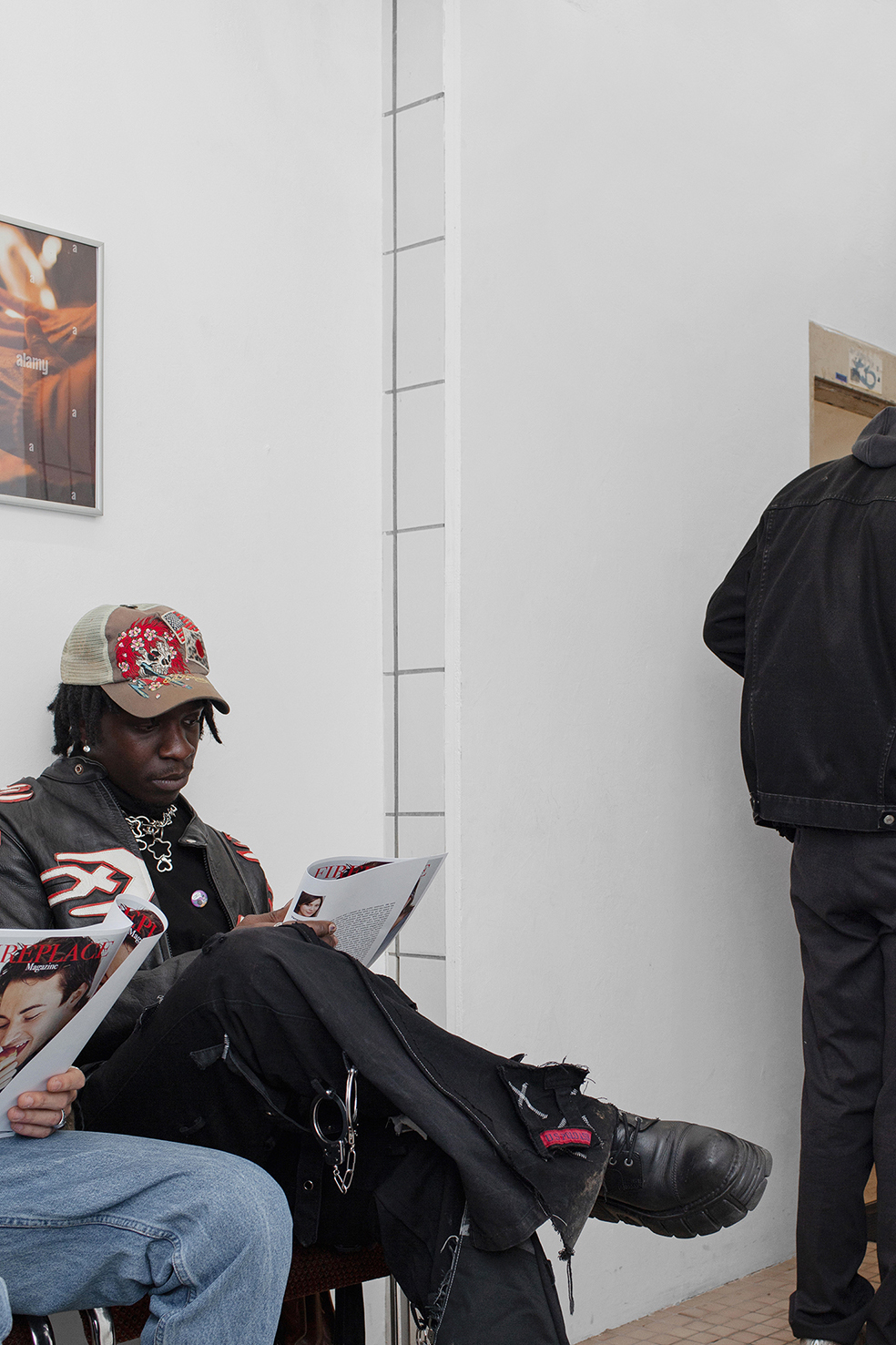
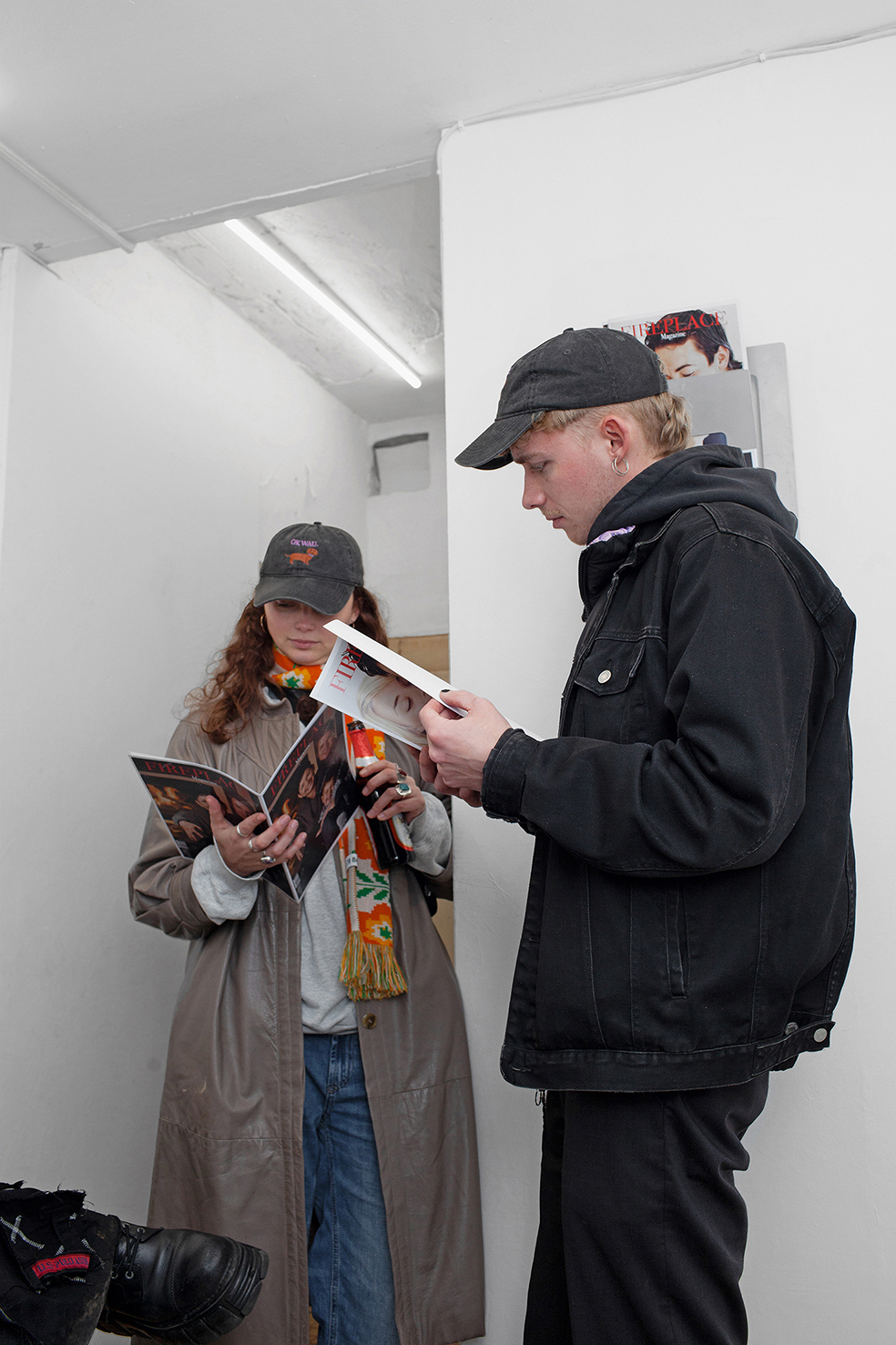
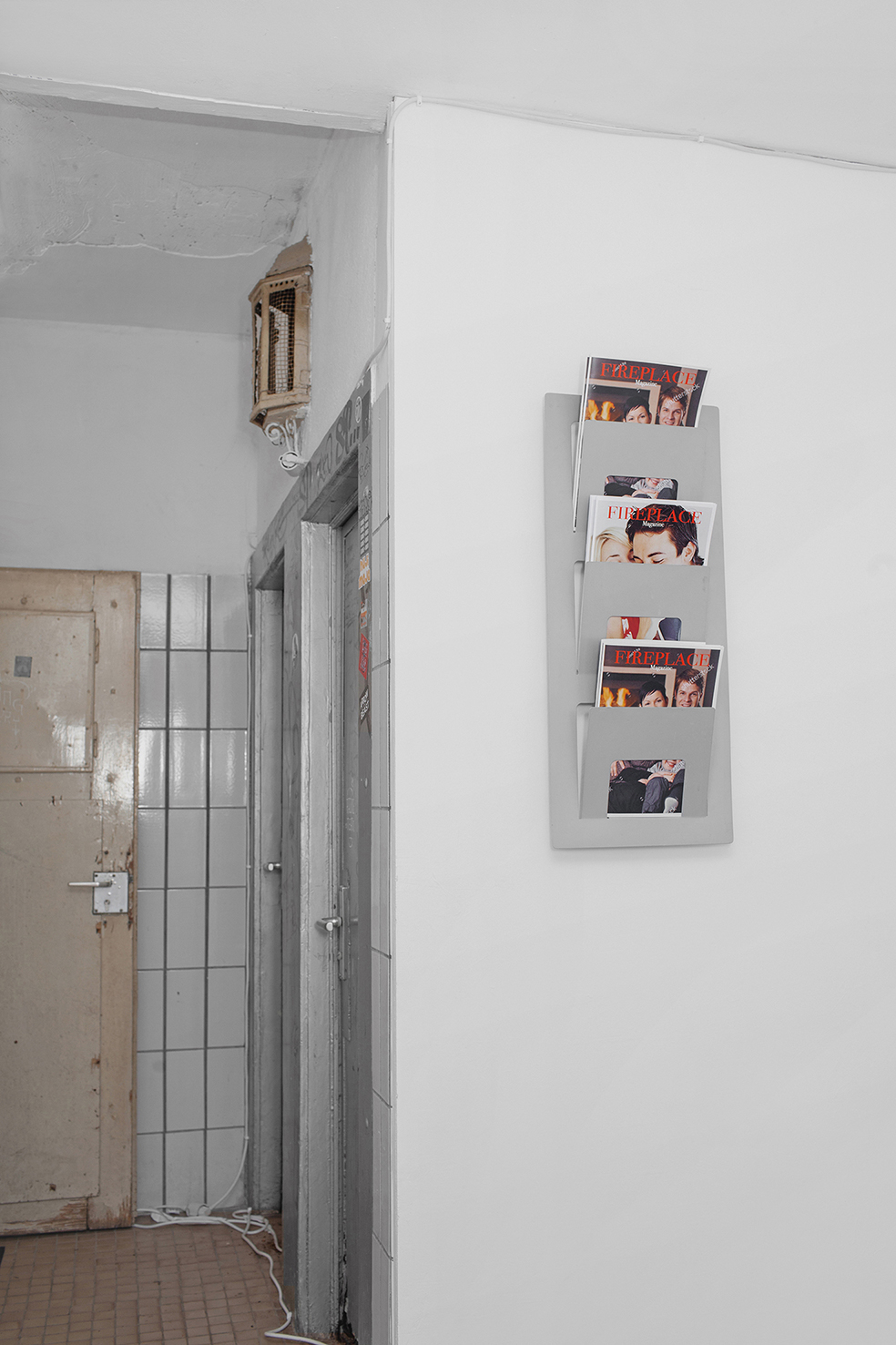
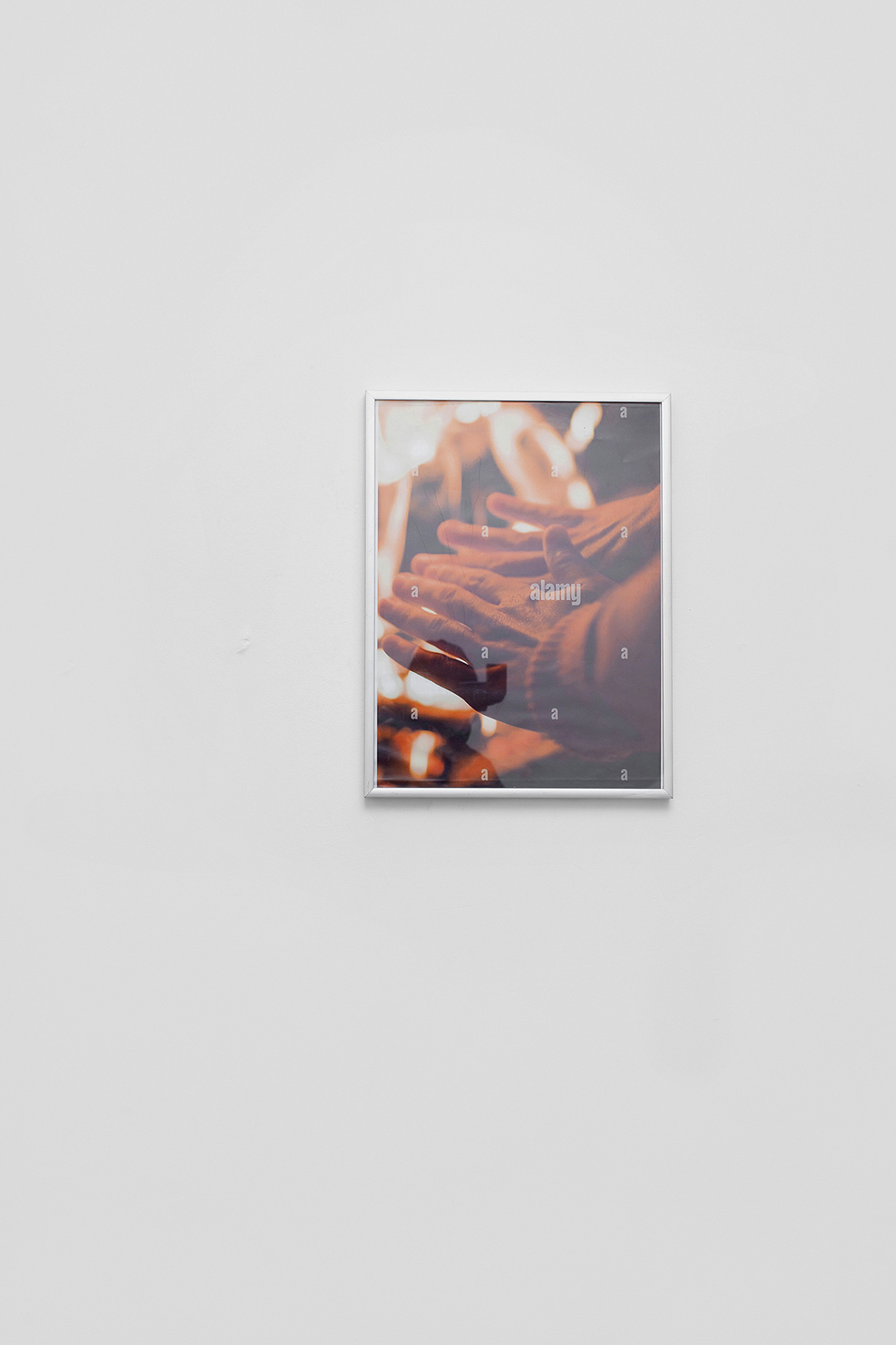
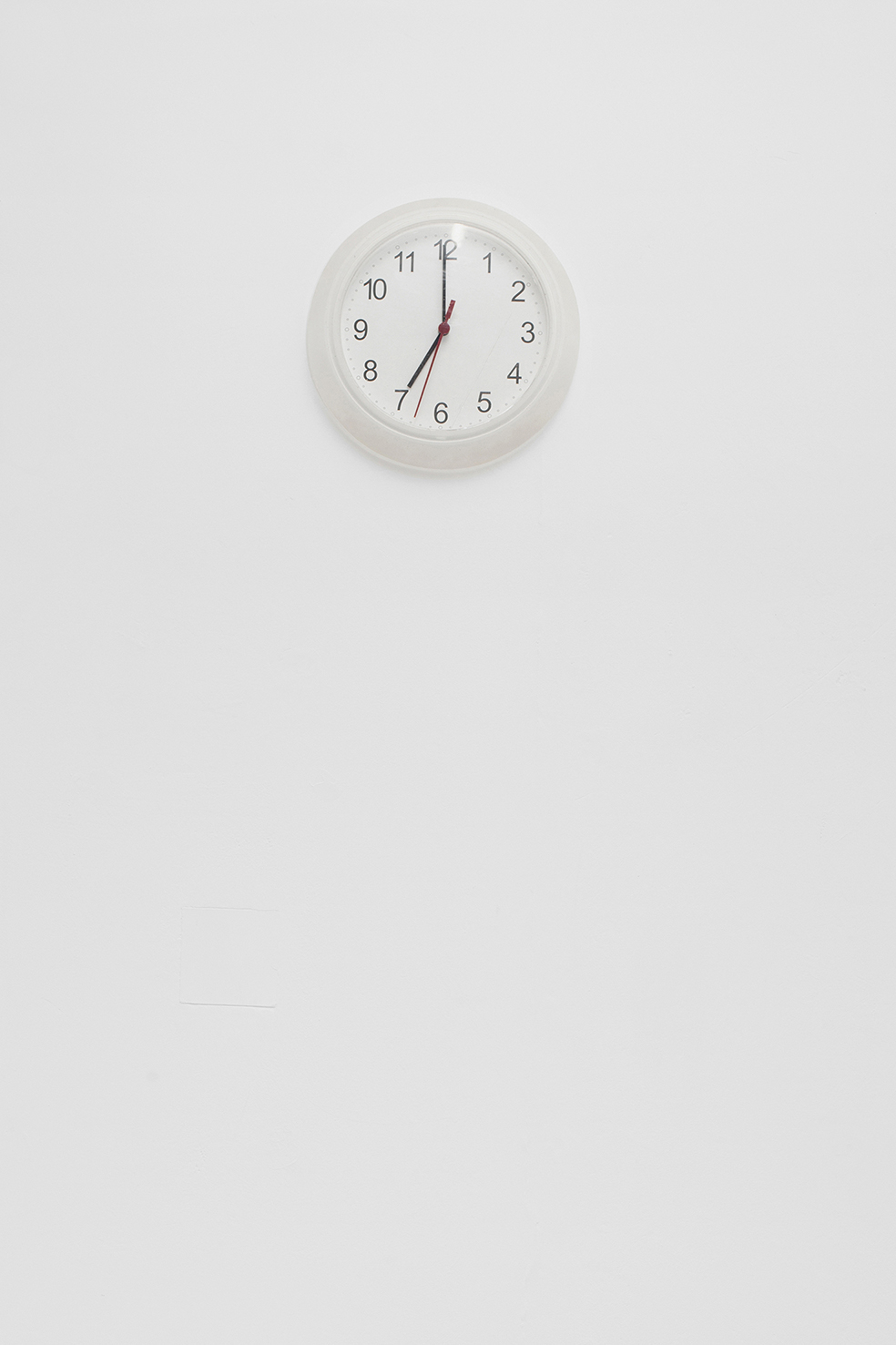
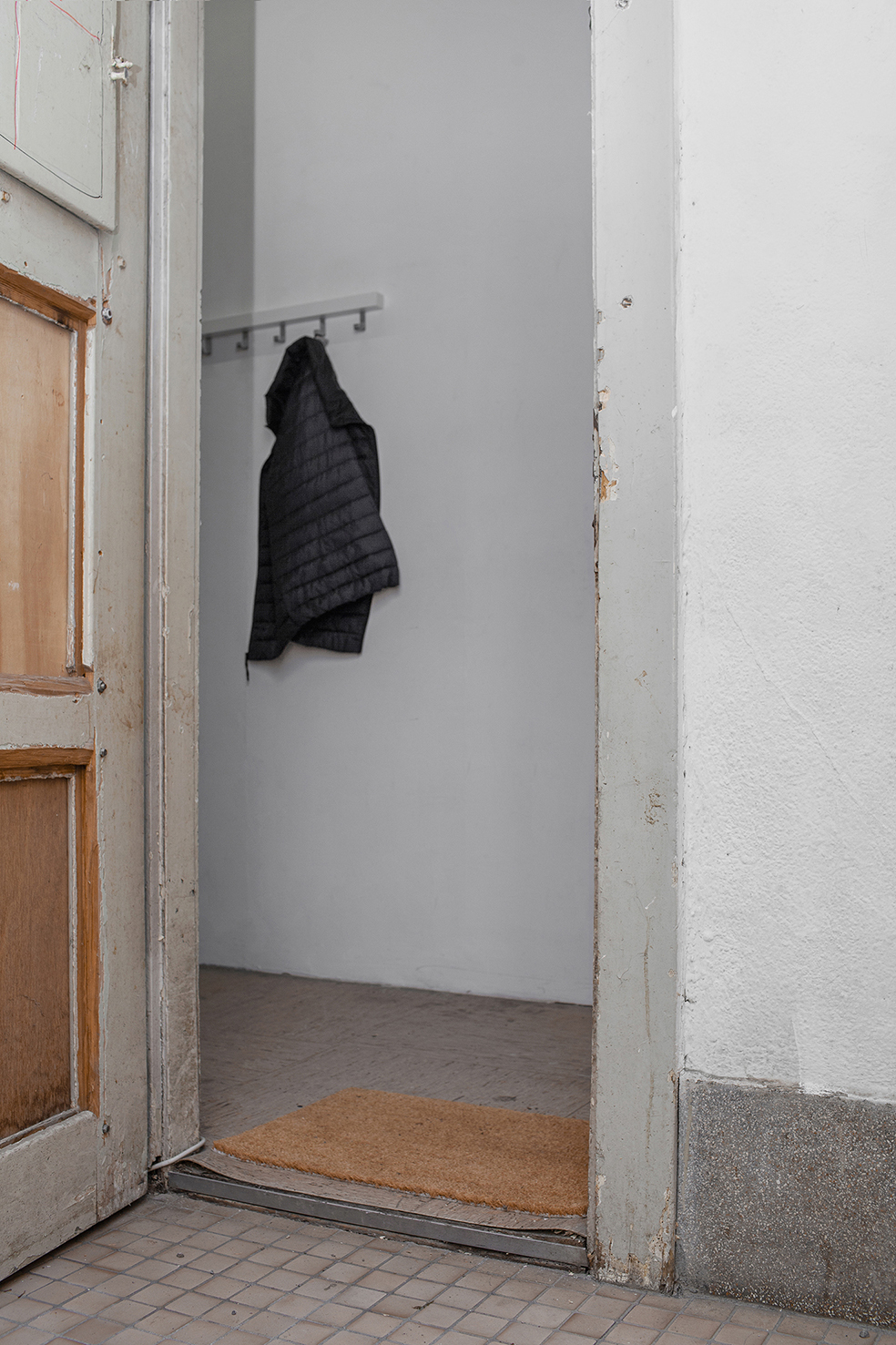
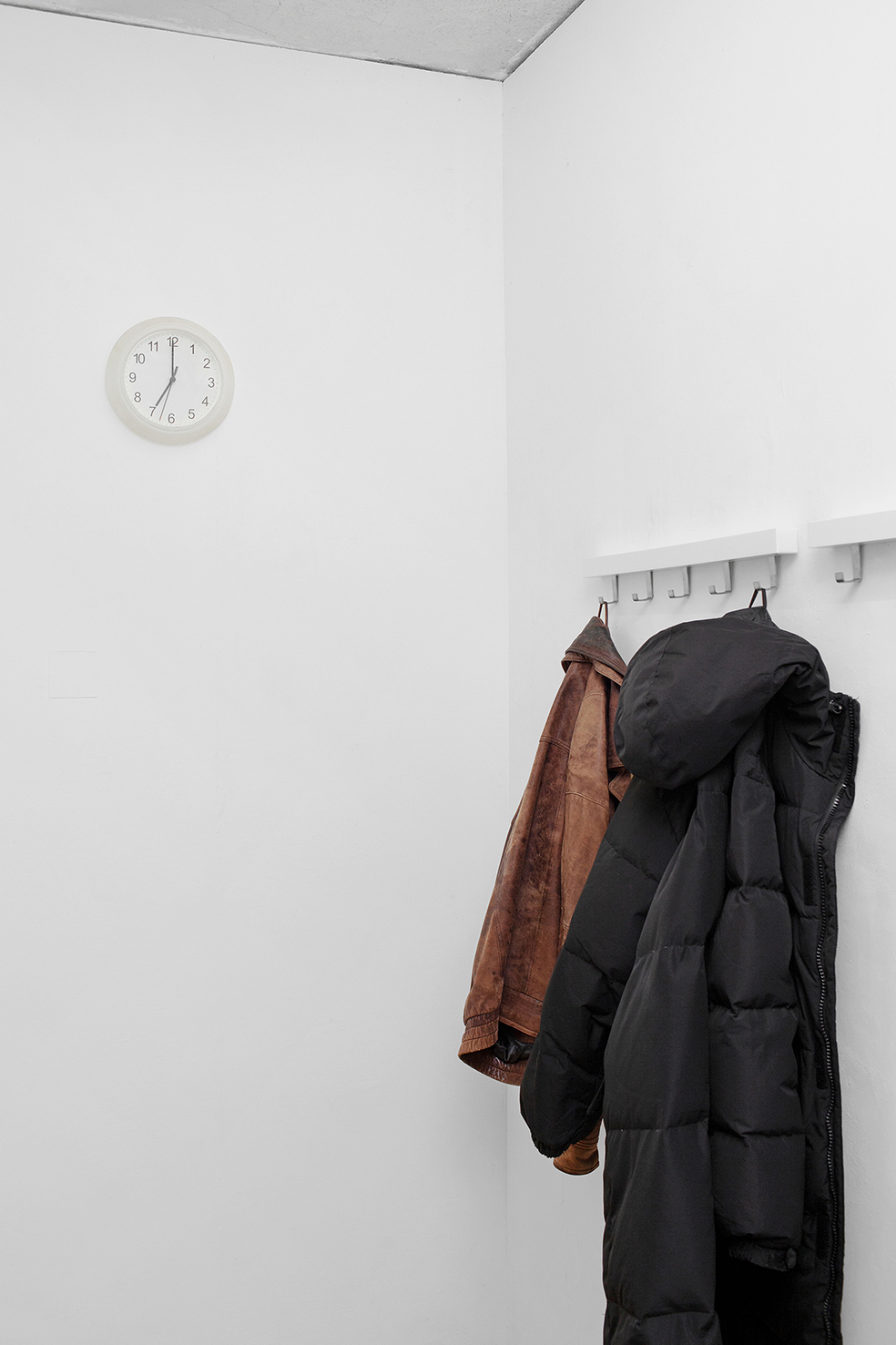
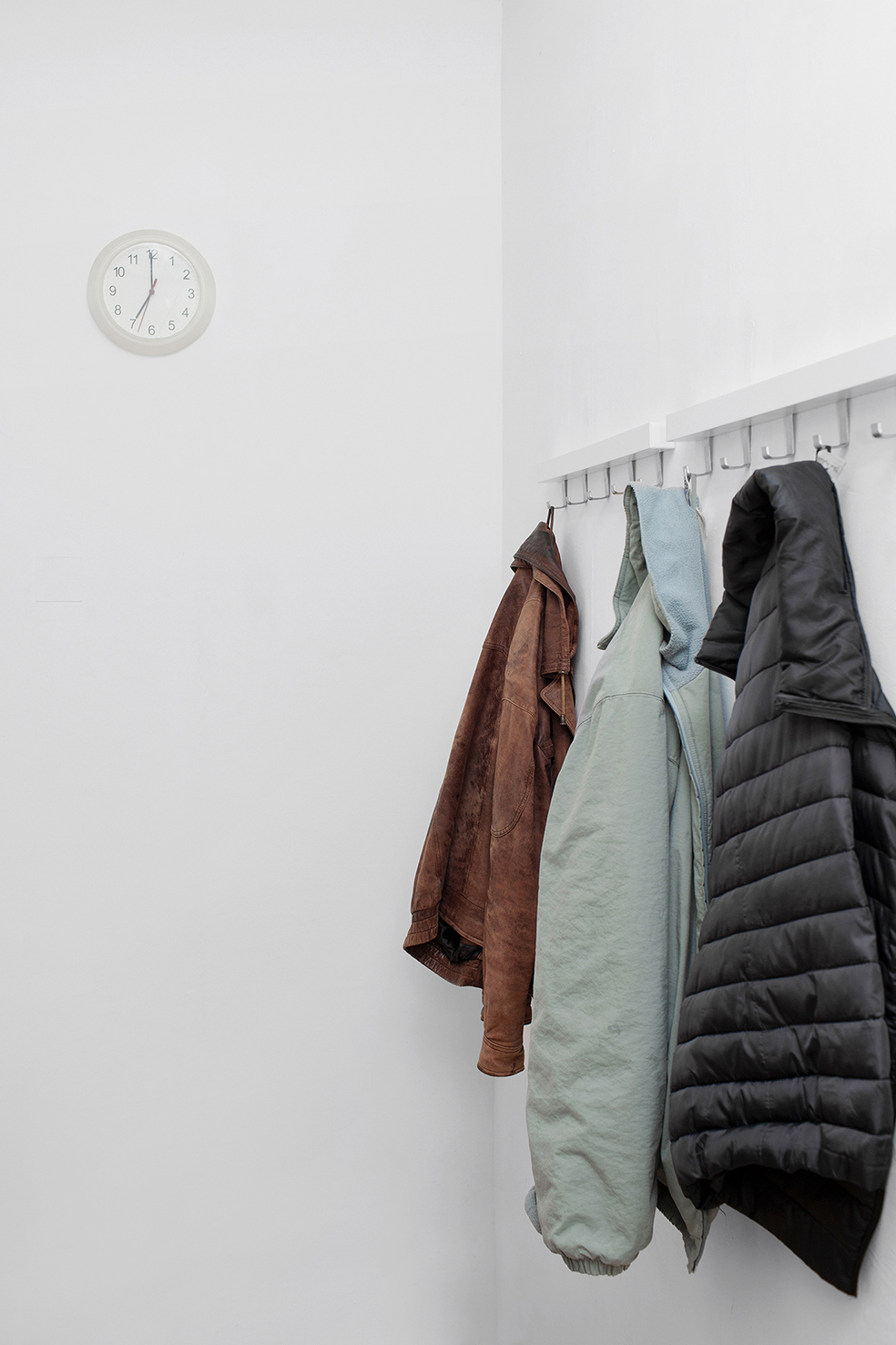
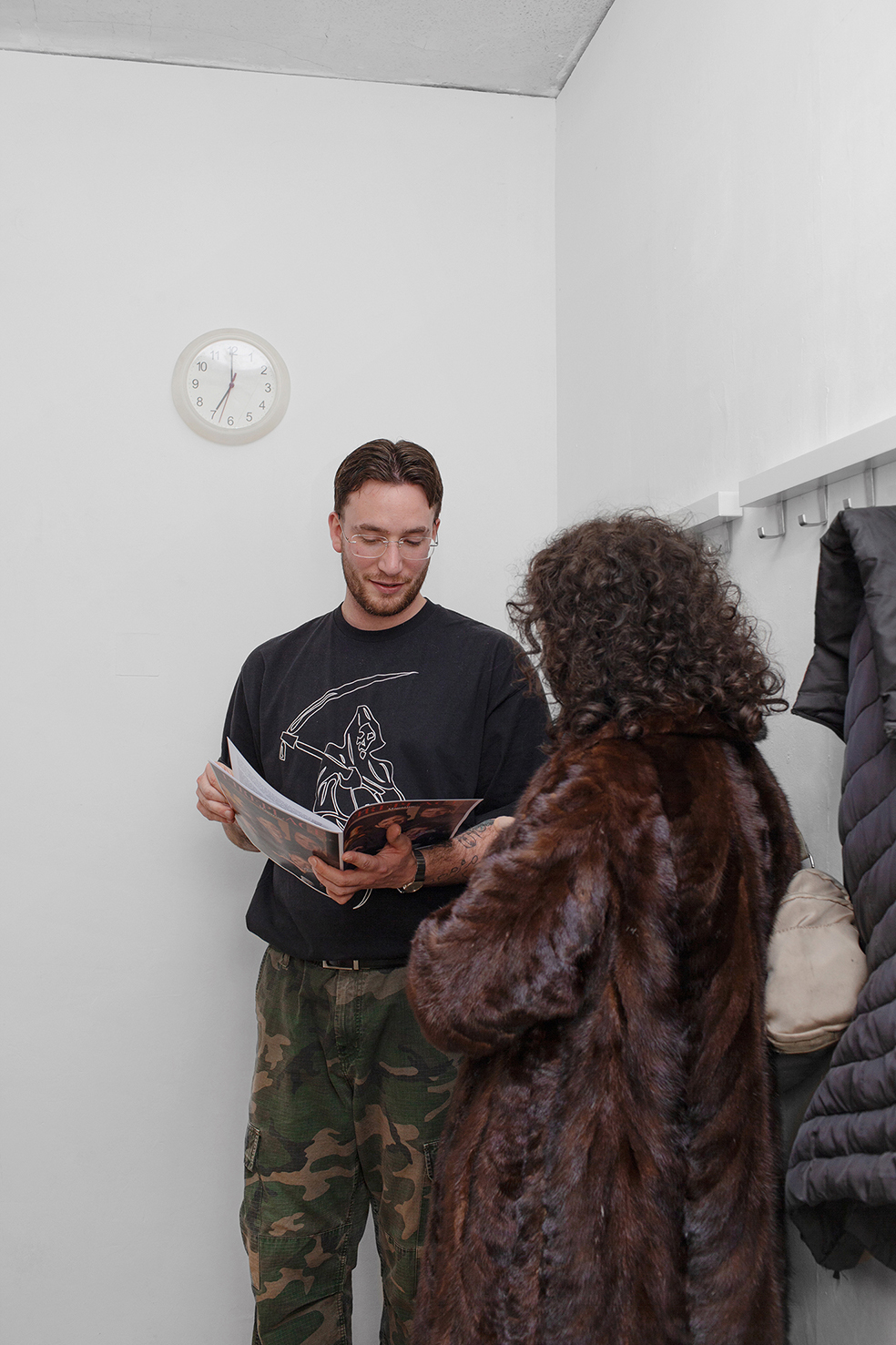
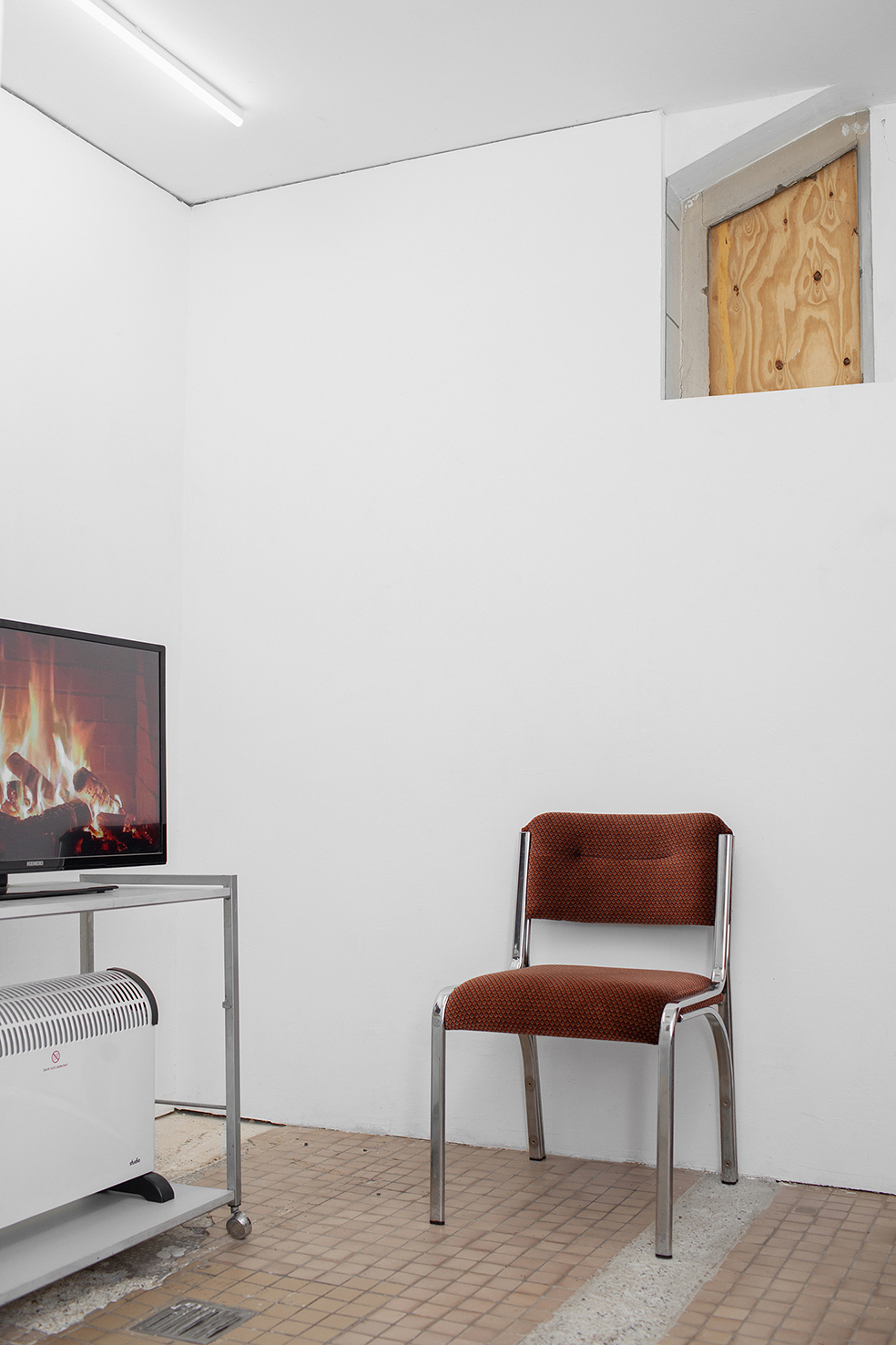
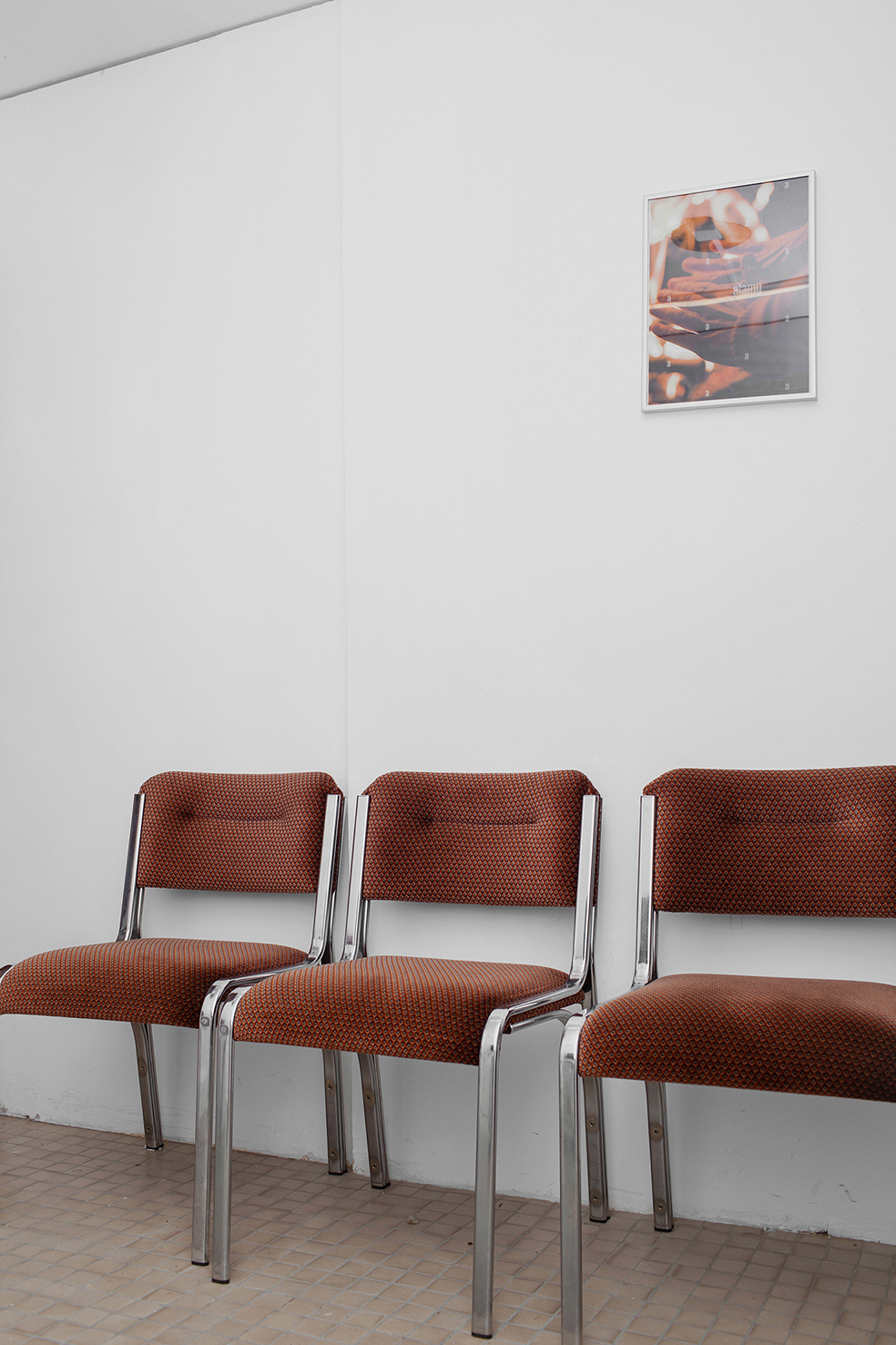
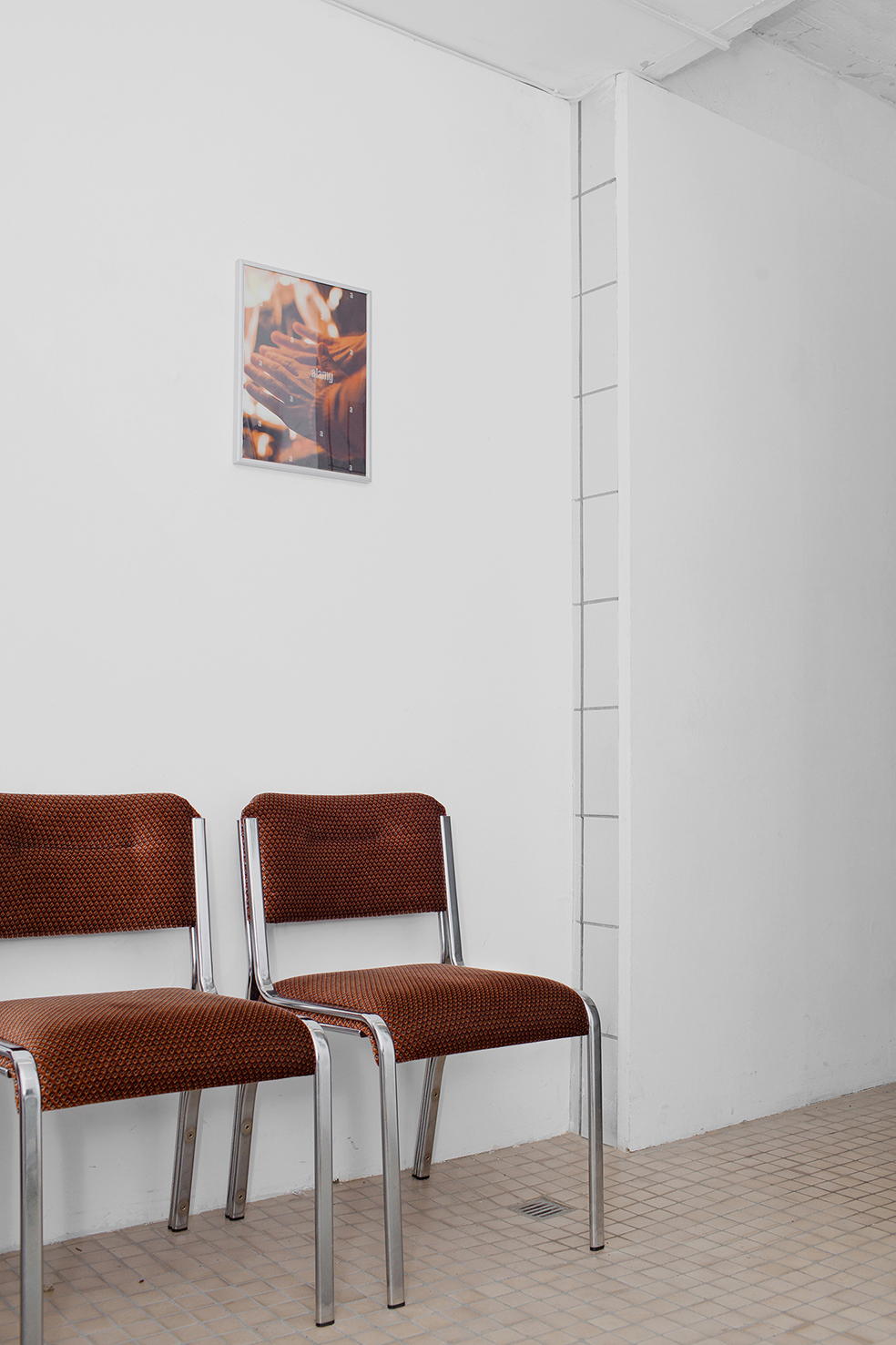
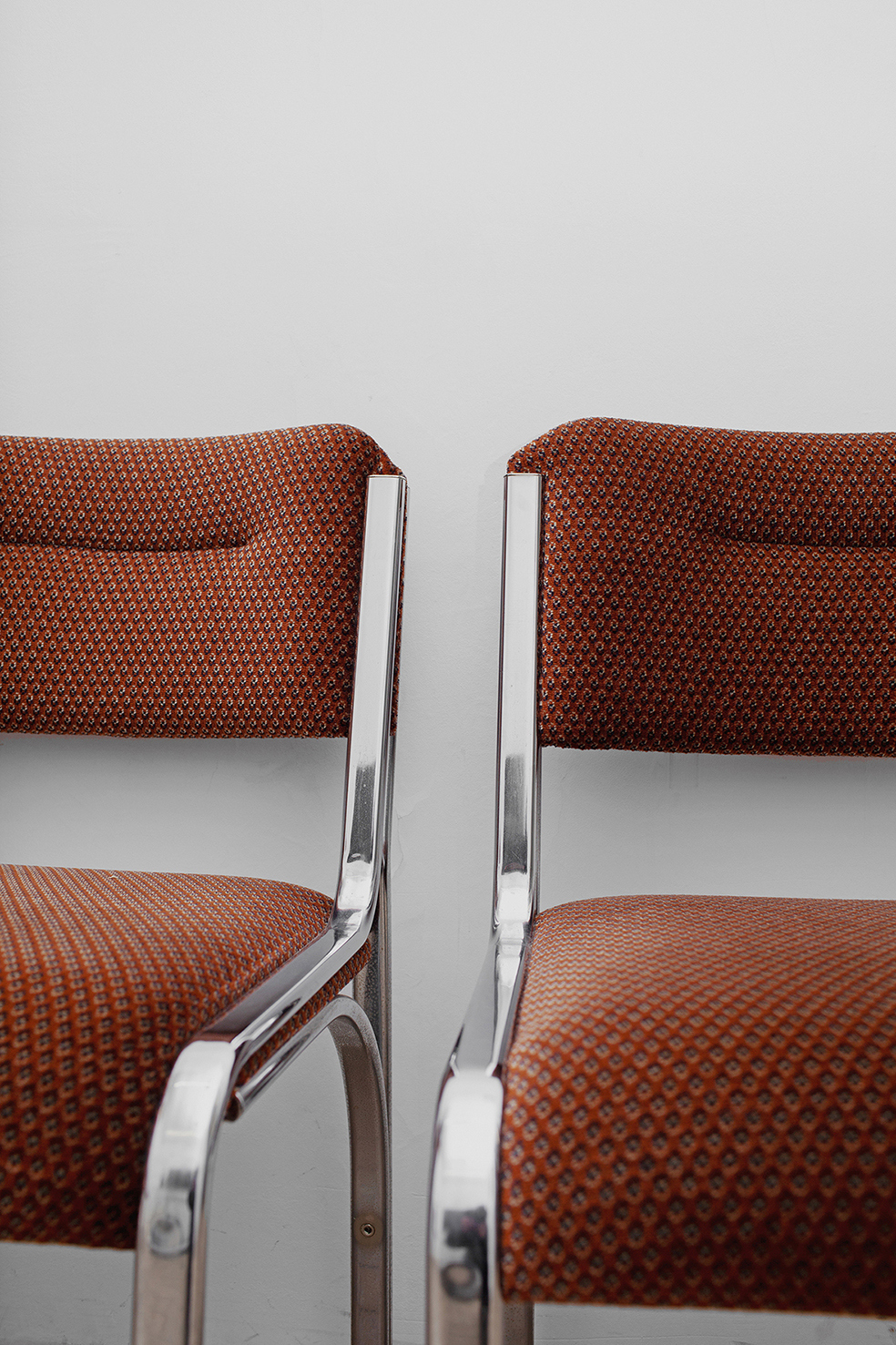
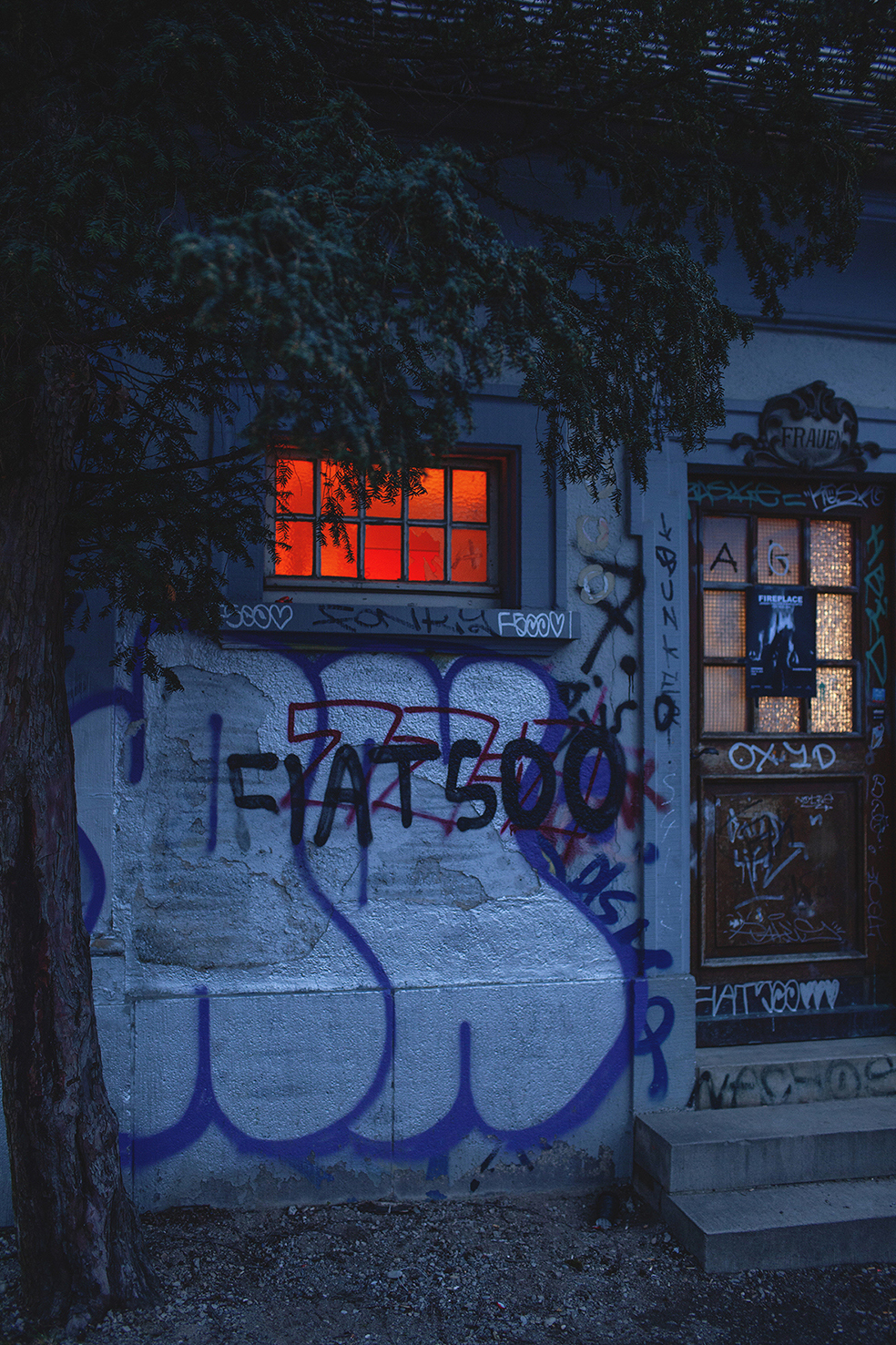
Kaiserwache is pleased to present FIREPLACE, a duo-exhibition by Jeremy Palluce and Marco Spitz.
Previous collaborations between the artists have shown a mutual interest in questioning the norms and conventions of art and exhibition-making. They explore the contradictory effects of incorporating subversive and non-compliant attitudes into an ever-evolving art apparatus. FIREPLACE now explores this interest further, shifting its focus to the exhibition space as a site of gathering and highlighting the ritualistic aspect of exhibition openings.
As you approach, you'll notice the inviting glow of warm orange light spilling from the windows of the former restroom shack, cutting through the chilly February night. Stepping inside you’ll be greeted by a doormat at the entrance to the first room reminiscent of entering someone's home. The air is comfortably warm, and several coats hang neatly along the wall; this space has been transformed into a cloakroom for your convenience. A modest wall clock catches your eye, with its second hand ticking in place, jumping between seconds, seemingly frozen in time, perpetually marking 7pm. Moving into the main room, you'll find a curious arrangement of chairs encircling a television screen, where a recording of a crackling fireplace plays, casting a comforting ambiance. The source of warmth is revealed to be a heater positioned just beneath the TV. Mounted on the wall next to the chairs, you'll spot a brochure holder containing copies of a magazine titled “Fireplace”. Inside, you'll read the following:
K.ELIOT
My whole life, I feel guilty, even when I've done nothing wrong. When someone on the street calls out "Hey, you there!" I automatically feel addressed and a sense of panic runs through my body. When I leave a store without buying anything, I feel as if I'm stealing, and worst of all: as if everyone knows. Back then when students in my class misbehaved and the teacher asked who did it, shame started bubbling up within me, even though I hadn't done anything. I always felt that if a punishment were to befall me, it was for a good reason, as if I deserved it. So can it be blamed on me that I feel guilty about this, my situation ?
I don't even know exactly how I ended up in this room, I saw the warm light streaming from the windows, outside it was cold. Who could blame me for going to the door and entering when I found it open ? Besides, any refuge from my own home is welcome to me…
However, inside there's no fireplace in the classical sense, as you can see. Also, the light inside is bright, white, and sterile. Now I sit here and wait. Of course, by now the thought of what I'm waiting for torments me. Am I doomed to wait here, hoping that something will happen ? Or is it because of me that the situation is like this? Am I to blame ? Is this room, this waiting, trying to confront me ? Maybe even with my own thoughts ?
My previous descriptions seem to confirm this at least… Nervously, I shift in my chair, next to the screen. I hadn't dared to sit on one of the three chairs facing the TV... I didn't know who else might come...
In any case, I fell into the trap. Of course, I could have had the opportunity to disappear immediately, but something keeps me here. Is it curiosity ? Maybe the door will open, or perhaps one of the toilet stalls will become available ? Am I to blame ? Should I perhaps set things in motion here ?... On the other hand, I dare not. Do I perhaps deserve to be trapped here in this endless loop ? Is this the ultimate escape from the outside world ? From any worldly responsibility ? If so, I'll obviously stay here for a while longer and will face the tormenting wait.
Stefan L.
The rather outdated chairs remind me of my father. He had similar ones in his apartment, one at the desk, the other as a clothes rack next to the bed. They were used but not worn out. I wonder what happened to his chairs. My last visit before his death was years ago, but something about the atmosphere of this exhibition transported me back to his room. I remember the garlic-like smell in the air, which my father covered with heavy cigarette smoke. I see the half-closed curtains and the soft light that bathed the room in golden hues. At least that's how my memory left it. I wouldn't say I often think of him; some memories of him or with him I would rather forget. But I can't forget his room. It was the room of an alcoholic, a space for alcoholism. And yet, the memory of his room gives me some comfort.
His room remained honest with me, behaving almost opposite to the distance and aloofness of my father. The dust bunnies scurrying across the parquet floor with each step, the bottles of grain brandy poking out from under his bed, the full ashtray he refused to empty, and the torn letters from the authorities on the chaotic surface of his desk reflected fragments of his life and inner world, which he concealed, even though some of these things were blatantly evident to the family. His alcohol consumption remained unaddressed between us during his lifetime. His room was a barren landscape: white walls, a bed, a desk, a heater, a television, and a lamp. At least superficially, the situation in the restroom wouldn’t have looked entirely dissimilar to his room.
Chairs placed against the wall, a television playing a video of a fireplace in a loop, and a radiator; an arrangement that doesn't draw too much attention to itself and, in my opinion, only serves as a backdrop. In my opinion, something else, something I can’t quite point my finger to, is in the foreground of the exhibition. Someone referred to this exhibition as a waiting room, but that simply doesn't capture the given situation accurately. What is this space for? Not for waiting, not for warming up, not for experiencing art, and not for talking. I tried to follow the audio book; it was "Waiting for Godot," but my thoughts kept wandering back to memories of my father. I don't want to completely dismiss the interests of the artists, but isn't every exhibition primarily a canvas for the mental projections of the visitors, a place that triggers an uncontrollable mental cinema?
My father's habits were detrimental to our family life, to say the least. He realized that himself. For this reason, the uncomfortable situation at home and to escape my mother's constant scolding, he decided to move into his own apartment and leave us, my sister and me, to pursue his priorities in peace. My mother let him abandon us. The small apartment was our property, inherited from my father's father, who had died before I was born, and passed down to the family. My father had lived there before starting a family, before he and my mother had me and my sister. It must have been a kind of return for him. He didn't need much and didn't want much more than a pack of cigarettes and his few liters of beer and brandy every day. Yet something must have been missing for him, something that even we as a family couldn't provide. Even drinking, which eased that piercing feeling of lack, came with its own pitfalls. It engendered the suffering of numbness and mental drifting, which brought about a vicious cycle of drinking against the plight.
I know that on days off, after a few glasses during the day, he would sleep in short intervals, which, I assume, combined into a long, contiguous half-sleep. But it’s hard to believe that it was a healthy sleep. I heard him complain about nocturnal insomnia. He was an exhausted person in many ways. As a teenager, I always hoped that one day he would wake up fully rested and come to us with gifts, telling of his transformation, how selfish and irresponsible he had been, and beg for forgiveness and reconciliation. But my fantasy never came true. Shortly after I finished school, they separated, and after that, I saw him very rarely. My image of him gradually turned into a silhouette and I believe he wanted it that way. I couldn't understand my father back then, that is, before I inherited his habits and turned to the bottle myself.
Vanessa R.
On the way to Paul's party at his shared apartment, Franzi and I passed by the decrepit restroom shack. We were surprised to see smoke coming from the chimney. Franzi wondered what it looked like inside. I told her that Lotte mentioned the shack now being used as an art space or something. Lotte had mentioned something about an exhibition with wood shavings, but I don't remember the details. It didn't come across as very convincing. Quite peculiar. Who even cares about seeing art in a restroom? Art for the loo. That's a joke, right? Modern art, huh? More like a circus of pretentiousness pretending to be "profound" and "meaningful." Who's being fooled here? And let's not even start with the critics and collectors who rave about the latest piece of junk just because it's trendy or shockingly controversial. It's all just a facade, a carefully staged illusion to maintain the elite minority in power and leave the rest of us puzzled. As if splattering paint on a canvas or arranging random objects in a gallery would say anything profound about the human condition. Please, spare me. Behind all the hype and clever words, modern art is simply a money-making scheme and is there to maintain the status quo. It's meant to distract us from important things. So excuse me if I laugh at the next "masterpiece" being touted as super important. Franzi agreed with me on certain aspects, but she said I should engage more with the art because there still are important things to glean from it. I just can’t submit to the demands of this kind of art. Art always relies on some form of suspension of disbelief. Looking at art often feels like trying to convince myself that something means something to me when it's completely foreign. I observe other friends looking at a painting or sculpture, pretending as if they find deeper meaning in it. However, everything except their words reveals that they are engaging in acting to align themselves with the exclusive, elitist group of connoisseurs whose status they covet. Art people take themselves too seriously. For Franzi, this wannabe behavior seems to stir something within her as well. But I try not to judge her for it. To each her own, I guess. She asked if we shouldn't venture in for a moment. Orange light was shining from the windows, and a few people were standing at the entrance, but it didn't seem very inviting. I had no interest whatsoever, and we were already fashionably late. Paul was already waiting for the gin and tonic ingredients we were supposed to bring. So we continued on to the party. It was one of those nights where you feel alive, where the world seems to stand still for a moment, and anything seems possible. At least until my ex-partner showed up, but that's a story too personal.
Anyway, Franzi later told me that on her way back from Paul's, she passed by the smoking chimney again and that even at that hour, a small group of people was still standing outside the entrance. So she just went in, alone. Only Franzi would do something like that. She said the inside still looked like a public toilet, just without the stalls and sinks. So not at all like a public toilet! There was a kind of cloakroom at the entrance with a coat hanging in it. Franzi tried to convince me that it was part of the artwork. Yes, truly genius. The idea was to hang up one's own jacket and then enter the next heated room. One's own clothing became art. Franzi found herself alone in the next room. She paused before continuing. She put on a different face and tried to infect me with her enthusiasm. She always keeps trying, that's just her way. But I have a resistant immune system against such things. There was a television in the room, showing a video recording of a fireplace, and a few chairs. Apparently the smoke in the fireplace was also fake; there was no fireplace, just a fog machine creating the illusion of a real fire. Smoke and mirrors. The actual warmth was provided by a space heater. Sounds ecologically sustainable! It was an exhibition of two artists. "To come up with such an idea, one single cis-het male mind was probably not enough." She laughed. I asked her what fascinated her about this fireplace simulation because I couldn't imagine it. She said it wasn't just the fireplace that interested her.
It was actually that the exhibition reminded her a lot of a play called "No Exit" (I forgot the name of the author) that she saw in Vienna last year. The play is about three people who find themselves trapped in a windowless hotel room after their death, which turns out to be hell. A place where fatigue and sleep do not exist and people do not even blink. They are there to torture each other and confront their bad deeds. During the play the characters try to control and dominate each other. They talk about their secrets and want to have power over the situation in the room. In the end, they understand that the true hell is not the room but the feeling of being confronted with oneself and having no way to hide. Each character feels guilty and suffers without finding a solution. At the end of the play, the door opens, and a new character enters the room. This character will have to suffer the same punishment as the others: to be forever trapped in this room to torture each other. What a story, it even sounds somehow familiar! Franzi explained that it seemed as if the exhibition was destined for the performance of this play. Starting with the "fireplace." The hellish room and the restroom exhibition match in several elements. In fact, the stage play is also decorated with a fake fireplace. She remembered the recurring remark of the three characters that it was oppressively hot. Additionally, there are the bright fluorescent tubes that illuminate the figures and cannot be turned off. And of course, the chairs, just like in the play, except that there were four in the shack. But Franzi said that the fourth chair anticipates the ending in a sense and that could be a decision of the staging. Yes, that made sense: public toilets as hell holes. She found it exciting to recognize this stage set. "So do the artists perform this play there?" She answered negatively. There was only the room and its contents. Strangely enough, a recording of another play was playing in the room. It seems Franzi took this confusion somewhat as something positive. Franzi emphasized that there was absolutely no reference to the “No Exit” play in the exhibition text. She couldn't imagine why the mention was intentionally omitted. She asked me if maybe she was just seeing shapes in the clouds. Oh, Franzi, you're so sweet when you get too invested in your interests. "I have no idea." That's art for you. "Is it that important?" She agreed with my questioning but said she would still like to talk to the artists about it, out of curiosity.
C. LAVY
Actually I had expected a public toilet here, a "hygiene facility," to use that lovely expression. And indeed: Inside, traces of its previous use are still visible, from the stalls, the floor tiles, to the raunchy scribbles on the walls. But it seems to me now that it's a different kind of facility.
I've been puzzled for a while about what's going on with this space. Is it just for warming up, a place to stay during the cold season? Or do these rooms pose a completely different question to their visitors?
Perhaps it's due to my Christian upbringing and the eerie stories my grandparents once told me, but when I look at the never-ending fire on the screen in front of me, I inevitably think of a purgatory, as if the screen were a window to hell. And aren't the two protagonists in the audio book also waiting for "Godot," the little god?
Today, I no longer believe in such things, but this kind of imprinting probably lasts a lifetime.
Besides, I've read Dante and now wonder if the room I'm sitting in represents a kind of limbo. That place where souls must linger without their own fault. Souls that were too bad for heaven and too good for hell.
I remember, once in connection with limbo, hearing something about original sin. Since Adam and Eve ate from the fruit of knowledge and were condemned from paradise, all their descendants, meaning humanity, have been suffering from this original sin. So is this about guilt? Even if not one's own?
From limbo, one can only escape through the hand of God. Perhaps people here are waiting for a "Deus Ex Machina," a manifestation on the screen perhaps? The more I think about it, the less likely this theory seems to me. Maybe the room I'm sitting in is just a waiting room after all.
About the Artists:
Marco Spitz (*1999 in Schramberg) lives and works in Karlsruhe. In 2022, he completed his Bachelor's degree in Fine Arts at the Hochschule Macromedia in Freiburg. Since then, he has continued his studies at the State Academy of Fine Arts in the class of John Bock. Spitz has participated in various group exhibitions, including at Kunsthaus L6, Freiburg (2023); apARTtment, Gundelfingen (2022); Galerie 39, Düdelingen (2021); Pop-Up TEX, Freiburg (2020); Bark Berlin Gallery (2020); and L’Offspace (FWTM), Freiburg (2020).
Jeremy Palluce (*1994 in Luxembourg-City) lives and works in Luxembourg City. In 2020, Palluce received his Bachelor's degree in Fine Arts from the Hochschule Macromedia in Freiburg. He then studied Fashion Design at Hochschule für Gestaltung und Kunst FHNW in Basel, where he completed his Master's degree in 2023. He has participated in numerous exhibitions, including at Galerie Schlassgoart, Esch (2023); Tramsschapp, Luxembourg City (2023); Kunsthaus L6, Freiburg (2023); Mitteldeck, Basel (2022); Musée d'Art Moderne Grand-Duc Jean, Luxembourg City (2021); Valerius Gallery, Luxembourg City (2021 and 2022); and Bark Berlin Gallery (2020).
About Kaiserwache:
The former public restroom, known to Freiburg residents as "Kaiserwache," was well-frequented due to its central location in the city and proximity to the banks of the Dreisam. However, with its original purpose decommissioned, the question of finding an alternative use for the heritage-protected building has arisen. This question has become increasingly relevant, especially given the growing lack of space in Freiburg, despite many buildings remaining vacant. With this in mind, KW positions itself as an offspace that is concerned with its own temporality, interested in suggesting alternatives beyond its interim use. The space at KW acts as a catalyst for the presentation of site-specific works and the facilitation of discourse surrounding the institution of the public toilet. By showcasing site-specific works, KW offers a unique platform for artists to reflect on and engage with the space's heritage and temporality.
Curated by Christina Sperling, Lena Reckord and Ilja Zaharov.
This exhibition was funded by the Cultural Office of Freiburg and the Regional Council of Freiburg.
K.ELIOT, Stefan L., Vanessa R., C. LAVY, Ilja Zaharov
